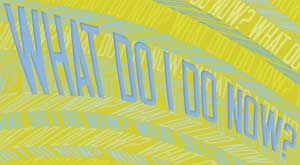features
ETHICAL IMMERSION
#webelonghere.
The hashtag reflected both a message and a movement. Galvanized by a police consultant's insensitive comments last fall, members of the student African American Society launched a campaign to raise awareness of the isolation they and others have experienced on campus. The effort opened with an emotion-packed meeting that drew about 150 people, creating a sense of optimism about the progress possible through constructive dialogue.
But within a few weeks, these same students faced a painfully different response.
During an on-campus march aligned with a national day of protest against police brutality, students in the #webelonghere movement discovered they were the subjects of demeaning anonymous posts on the social media site Yik Yak, where commenters are typically in close proximity. The university community faced a profound question: How does a campus respond when principles of free speech run headlong into standards of mutual respect and decency?
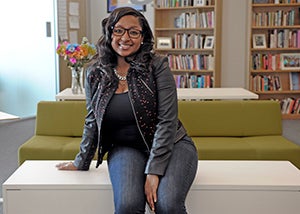 photo: Roadell Hickman
Destinee Henton
photo: Roadell Hickman
Destinee Henton
As president of the African American Society, senior Destinee Henton was among the students who played a primary role in the launch of #webelonghere. It would be easy—but not strategic—to attack back online, to explain that the hateful posts proved the need for #webelonghere. Instead, movement members and their faculty advisers dispatched emails to spread the word about what happened. Henton sent university leaders examples of the posts the next day, urging them to "take a stand."
But not everyone favored public comment. Some administrators argued against it, concerned about the wisdom of bringing broader attention to the ugly sentiments.
Case Western Reserve President Barbara R. Snyder understood the worry but believed the university needed to leave no doubt where it stood. She sent an email to the entire campus, asking its members to join her in condemning the posts.
"These comments run counter to all that we stand for as an academic institution," she wrote. "... The single best response to ignorant expression is to engage it directly."
Many of those who wrote university leaders felt vindicated. "The president has spoken," Henton said. "It means something."
The fall's events highlighted difficult realities on campus. They also represented a real-world experience in the kinds of ethical reflection and decision-making that Case Western Reserve seeks to encourage. The university provides a space for young people not only to master the academic knowledge of their discipline, but also to become better prepared to handle life's dilemmas, and decide who they are and how they want to live, both on campus and beyond.
"Lots of universities embrace ethics abstractly—who doesn't want to be ethical?" asked Michael Householder, PhD, associate director of the SAGES (Seminar Approach to General Education and Scholarship) program. "What separates Case Western Reserve is that this commitment to ethics is part of our core identity."
Since 2004, the universally required SAGES courses have been designed to equip undergraduates with the basic tools to undertake critical thinking and ethical deliberation.
For Jeremy Bendik-Keymer, PhD, who works closely with SAGES, that means challenging students to participate actively in directing course content. Bendik-Keymer is the Elmer G. Beamer-Hubert H. Schneider Professor in Ethics, a position created in 1996 not only to teach and conduct research, but also to coordinate programs funded through the Beamer-Schneider endowment that aim to make undergraduate ethical learning on campus so ubiquitous that it touches everyone.
"As a university, how do we promote people being ethical?" asked Bendik-Keymer, also an associate professor of philosophy. "We must support their capacity to think for themselves."
In a philosophy seminar this spring, Bendik-Keymer and his students hashed out a series of thorny environmental questions. Among them: Does individual action have value in the face of issues such as climate change that play out across the planet and over generations?
"To say it's inconsequential is letting yourself off the hook," said Nate Mullin, a biology and philosophy major from Brookline, Mass.
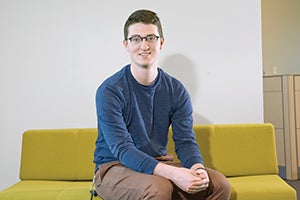 photo: John Quinn
Nate Mullin
photo: John Quinn
Nate Mullin
By Mullin's own account, Bendik-Keymer's course has made him think long and hard about whether an individual act—such as buying a fuel-efficient car or recycling—is morally valuable, even if it has no measurable benefit to the world. He hasn't fully made up his mind, but acknowledges that the reflection itself has changed him.
"After devoting this much brain space, you can't go back to really feeling ignorant," he said. "If I think something is right or wrong, I'll have to act on it. I can't just let it sit there."
As students describe and analyze positions on challenging issues, their ethical identity evolves; as they learn to state opinions and navigate disagreements, they can freely question assumptions; and as they communicate their identity through campus interactions, from friendships and first loves to protests and service to the larger community, they gain the confidence to rely on a steady moral compass.
That's why people such as Bendik-Keymer and others also offer opportunities for ethical dialogue that complement the classroom experience. Ethics Table brown-bag lunches, organized by Bendik-Keymer and open to the campus community, offer regular opportunities to debate issues. Ethics Table Fellows, a group of faculty and students, meet monthly to discuss ethical theory while working on individual projects. The Office of Greek Life hosts an annual daylong session for incoming chapter presidents that in part examines ethical leadership. The university's Inamori International Center for Ethics and Excellence and the Social Justice Institute offer other opportunities to explore challenging issues through research and teaching and translate beliefs into action.
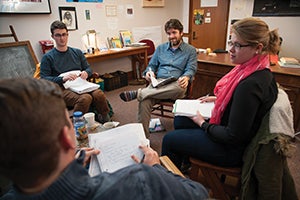 photo: Mike Sands
Jeremy Bendik-Keymer meets with students in a philosophy seminar course.
photo: Mike Sands
Jeremy Bendik-Keymer meets with students in a philosophy seminar course.
Susan Schick Case, PhD, associate professor of organizational behavior at Weatherhead School of Management, developed a new SAGES seminar as an Ethics Table Fellow in the spring of 2013. In "Ethics for the Real World: Creating Your Ethical Code to Guide Decisions in Work and Life," Case watched with fascination as seminar participants debated the sources of their personal beliefs, including religion. She found that the discussions promoted honest self-reflection.
"What really brought the class together was bringing perspectives across the religious spectrum, such as Buddhism, Islam, Judaism, Christianity and Hinduism, to examine deeply rooted values," she said. "Whether the students were religious, spiritual, agnostic or atheist, we were trying to build integrity and character [to encourage students] to do the right thing." As a final assignment, students wrote their "Ten Commandments of Character," with a few calling them an ethics code. At the end of the class, Case gave students laminated copies of their own ethics codes.
Cole Morris, a sophomore from North Royalton, Ohio, chose Case's course mainly because it fit his crowded biomedical engineering schedule. But he soon became intrigued.
"My biggest takeaway was forcing myself to understand other people and realize everyone feels they're right," he recalled. He also said he has taken ethical considerations to heart in his campus job selling advertising for The Observer, the student-run newspaper.
"Few local businesses want to advertise in college newspapers. I was trying to be a salesman, and overhype the benefits they could expect. But after the [SAGES class], that felt [wrong]. So I went to the director of print and said, 'What other options can we give them for the same price?' We started to include advertising in the online edition and a social media presence in our ad packages. We can give businesses a boost, instead of just getting the ads."
Ethical Learning Outside the Classroom
For Brittany Chung, a resident assistant (RA) who grew up in Kingston, Jamaica, and now calls Pickerington, Ohio, home, honest communication is integral to ethical learning. When a friend approached Chung last year so stressed out about an upcoming exam that she considered securing an older copy of the questions, Chung said: "Do you think it's fair that you have access to something that other students don't have?" Chung—now a junior majoring in chemistry and history—said the friend was open to what she had to say and didn't cheat on the exam. She also passed.
Before college, Chung wouldn't have challenged friends the way she does now. But a residence life mentor and the experience of living on her own gave Chung new confidence. "If I'm going to be friends with you, I should be able to call you out when you are, in essence, making a decision that is unfair or unjust," she said. "I also wanted friends to check me if I'm veering off on the wrong path."
Dan Doherty, an RA from Colorado Springs, Colo., has had to confront several difficult situations, each one in some ways better preparing him for the next. A junior majoring in biomedical engineering, Doherty works with the student-run campus emergency medical services squad; is in his second year as an RA; and, as a first-year student, was a fellow with the university's Center for Civic Engagement and Learning (CCEL), working with the West Side Catholic Center. He prepared donated clothing for people in need and learned through CCEL seminars about how communities and nonprofits address challenging issues.
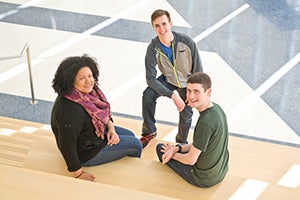 photo: John Quinn
Brittany Chung, Cole Morris, and Dan Doherty
photo: John Quinn
Brittany Chung, Cole Morris, and Dan Doherty
The experiences collectively made him better able to cope with several recent crises: helping his mother through the death of a faraway relative and working with his first-year residents after the death of one of their floor mates. And, he said, his knowledge of protocols serving as an RA and EMS worker prepared him to tackle issues that lack clear answers.
"It might be a little scary or uncomfortable," Doherty said. "But I think if you've been doing the right thing and know the protocol, it can help you get through the stuff that's about to come."
In the wake of the backlash last fall to #webelonghere, university leaders did their own reflecting. "No community is perfect," said Vice President for Student Affairs Lou Stark. "We must keep issues at the forefront. If we don't, we are failing our students."
As much as the institution had increased attention to issues of diversity in recent years, administrators realized more was required—and quickly. Officials committed to expand a pilot version of Sustained Dialogue, a national program designed to encourage meaningful conversation on college campuses, and are offering additional diversity education programs across the campus this fall.
"We had to put meaning and action behind what we claim is a desire for change," said Vice President for Inclusion, Diversity and Equal Opportunity Marilyn Sanders Mobley, PhD (GRS '87, English), who also is a professor of English.
Meanwhile, students involved with #webelonghere spent the academic year launching more conversations and seeing the cascade of others that followed. They also deepened their own ideas about social justice and ethical action, both in an individual moment and as part of a larger, longer campaign. How should they respond to concerns that their movement did not include other minorities? Should they challenge classmates who write derogatory comments on social media even as they conduct dining hall monologues on diversity? And should #webelonghere become involved in the surrounding Cleveland community after city police fatally shot two young black men—ages 12 and 18—in separate incidents?
As one of the publicly identified leaders of the effort, Henton said she finds herself wondering who is against #webelonghere when she walks around campus. But two key campus mentors have provided important advice and support: Rhonda Y. Williams, PhD, associate professor of history and founder/director of the university's Social Justice Institute, and Shannon B. Lundeen, PhD, assistant professor of bioethics and director of the Flora Stone Mather Center for Women. Today Henton feels more confident as an advocate and is focused on ultimate goals, not vitriolic comments.
"As students, a lot of times we can be impulsive," said Henton, who completes a BA and an MA in political science this month. "But one thing I took from this past year is to be strategic and intentional in everything I do."

